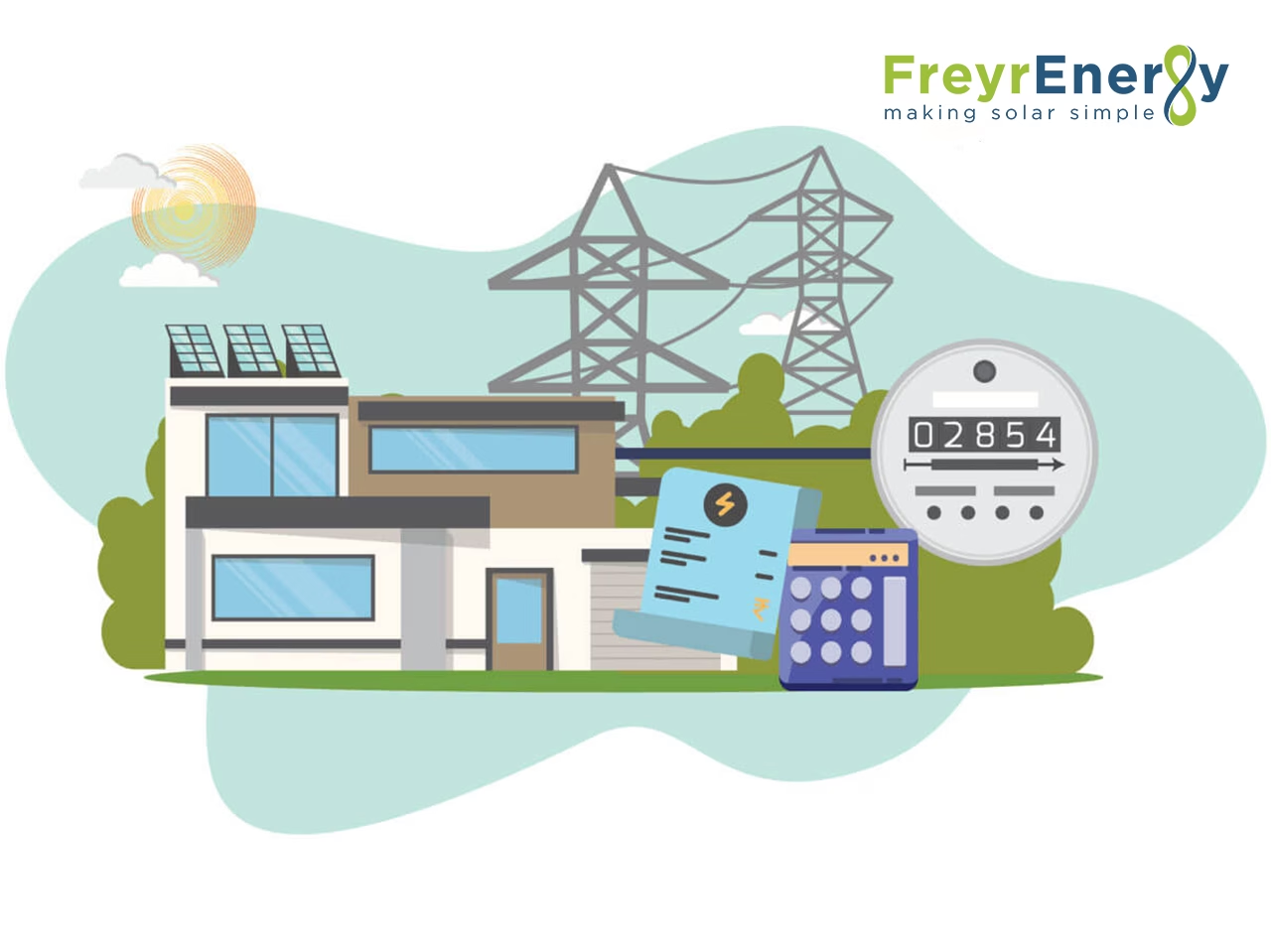In the world of renewable energy and solar power, we often meet three puzzling terms: net metering, gross metering, and net billing. Each of these systems has its complex advantages and disadvantages, with the choice between them depending upon many factors, including financial goals, local laws and rules, and the scale of one’s solar energy system.
In this article, we will start on a very deep/extreme trip into the definitions, pros and cons of net metering, gross metering, and net billing. Also, we think carefully about the extremely valuable guidance that Freyr Energy can give those trying to understand this confusing mystery.

Net Metering:
Definition: Net metering, a complex billing arrangement, gives power to owners of solar panels to transfer solar-created electricity back into the power grid, shared with credits to make up for future electricity expenses.
How It Operates: Within the net energy metering system, solar panels work continuously throughout daylight hours. Any excess electricity, beyond real-time required consumption, trips back to the grid. A bi-directional meter completely records both power imported from the grid and electricity exported to it.
Energy Production and Consumption: Solar power Net metering offers to people or businesses furnished with solar panels capable of going beyond their energy use. An ideal choice for those who want to free themselves from grid reliance and stop power expenses.
Metering: A single bi-directional meter serves as the silent observer, carefully supervising both grid-supplied electricity and the excess you feed to the grid.
Billing: Net metering involves a two-way billing structure. The first level takes the calculation of net electricity used and is subtracted from the electricity contributed to the grid. The excess electricity added to the grid is credited for future use.
Pros of Net Metering:
Economies: Net energy metering unwraps a path to cost savings because of collecting credits for excess electricity, effectively pushing away expenses.
Eco-Old book: A built-in eco-friendly, net energy metering flow, permits maximal in-house solar electricity use, reducing the carbon footprint.
Simpleness: Net metering is simple as it involves a single metre for metering energy flow.
Disadvantages of Net Metering:
Policies Rule Supreme: Net metering’s result is unavoidably secured to the complicated local policies and rules, which are confusing with changing locations.Credit, Not Coin: In certain regions, excess electricity credits may not be fully monetized, limiting the potential financial benefits.
Gross Metering:
Definition: Gross metering, or the feed-in tariff (FiT) arrangement, includes complex billing methods in which solar system owners sell all electricity they produce to the grid, ignoring personal energy use.
How It Operates: Under gross metering, all the electricity your solar panels produce is transmitted straight to the grid, and you get paid for it using a set feed-in tariff rate.
Energy Production: A good choice for owners whose first attraction lies in selling the electricity they gather rather than using it for their own needs.
Metering: In gross metering, a single unidirectional meter functions as the silent guard, metering energy sent to the grid, without distinction between what you generate and what you consume.
Billing: The gross metering billing system is based on the total electricity generated by your solar panels and fed into the grid, and you receive compensation at the agreed feed-in tariff rate.
Pros of Gross Metering:
Guaranteed Payment: You receive a fixed payment rate for all the electricity your system creates, providing a predictable income stream.
Cons of Gross Metering:
Limited Self-Consumption Benefits: With gross metering, you may miss out on the benefits of using your solar-created electricity to offset your consumption, possibly resulting in higher electricity bills.
Net Billing:
Definition: Net billing unwraps as a detailed mixture, twisting together elements of net and gross metering. It allows solar owners to sell the excess electricity to the grid while satisfying their own needs.
How It Operates: In the net billing system, you can use the electricity for your own needs, and any excess electricity is sent to the grid and credited at a predetermined rate. You will be billed only for the electricity you consume from the grid.
Energy Production: Net billing is the ideal choice for those who want to consume as much as possible of their solar-generated electricity while still making benefits from the selling of excess electricity.
Metering: A bi-directional meter, records a story of both the energy exported to the grid and the energy imported from the grid.
Billing: Billing in net billing is based on the net electricity consumed from the grid. Any surplus electricity exported to the grid is credited at the agreed-upon rate.
Pros of Net Billing:
- Satisfaction of Self-Good amount: Net billing gives you the extreme happiness of enjoying solar-generated electricity for personal use, with excess electricity sent as a message of thanks to the grid.
- A Stream of Earnings: You can still earn income by selling excess electricity to the grid while enjoying the benefits of self-consumption.
Cons of Net Billing:
- Dictated by the Code: As with its good friend, net energy metering, net billing’s fortune hangs in the balance of local orders and policies, following the solar laws.
The Path to Understanding:
The choice between solar power net metering, gross metering, and net billing depends on various factors. Here are some key considerations to help you make the right decision:
- Financial Adventure/trips: Net billing or net metering can be an ideal choice if your primary goal is to reduce your electricity bills as these systems allow you to offset your consumption with solar-generated electricity. If you are looking to generate income from your solar power system, gross metering can be the best option as per your requirements.
- Legislative Map-making: One of the major factors that affect the evaluation of feasibility and benefits options is local policies and regulations. Consult your local authorities or a solar energy expert to understand the regulations in your area.
- Solar Constellation Importance: The dimensions of the solar system matter most. A larger system may generate more surplus electricity, improving the attraction of net metering or net billing. Freyr Energy, the glowing provider of solar solutions, stands ready to light the path to clearness.
Here’s how we help:
Consultation: Freyr Energy can provide expert guidance on the best billing method for your specific needs and help you understand local regulations.
Design and Installation: We can design and install a solar energy system that aligns with your preferences whether it’s net metering, gross metering, or net billing.
Maintenance and Support: Our Freyr Energy Solar App allows you to receive real-time updates on your system’s performance and support when needed.
Conclusion:
The decision between net metering, gross metering, and net billing is influenced by several variables, such as your financial objectives, local laws, and the size of your solar energy system. Freyr Energy can assist you by offering professional advice and setting up a solar energy system that most closely matches your requirements and local laws. Making the best decision will enable you to get the most out of your solar investment, whether that means lowering your electricity costs or earning money from renewable energy sources.
Frequently Asked Questions
It totally depends on your requirements and the intention behind installing a solar power system.
Net metering will compensate you at the retail rate, whereas net billing will compensate you at the lesser supply or wholesale rate.
Electricity net generation is the amount of gross electricity generation a generator produces minus the electricity used to operate the power plant.



